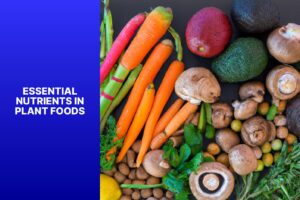
Making the switch to a vegan lifestyle can seem like a daunting task, but it is a decision that can have a profound impact on your health and the planet. Veganism is not just a diet, but a lifestyle that promotes compassion and sustainability. In this comprehensive guide, we will cover all the important aspects of going vegan, from the health benefits to the environmental impact, and everything in between. By the end of this guide, you will have all the information you need to make an informed decision about whether a vegan lifestyle is right for you.
The Health Benefits of a Vegan Diet
A vegan diet can provide numerous health benefits, including lower rates of heart disease, type 2 diabetes, and certain types of cancer. Veganism can also help with weight loss, as many plant-based foods are naturally low in calories and high in fiber. Additionally, a vegan diet can improve digestion, boost energy levels, and enhance overall well-being.
Environmental Impact of Veganism
In addition to its health benefits, a vegan lifestyle can also have a positive impact on the environment. The production of animal-based products is a leading contributor to greenhouse gas emissions and deforestation. By reducing the demand for animal products, vegans can help reduce their carbon footprint and promote sustainability.
Making the Switch to a Vegan Lifestyle
Making the switch to a vegan lifestyle can seem overwhelming, but it is a gradual process that can be done in stages. Here are some tips to help you get started:
- Start by incorporating more plant-based foods into your diet, such as fruits, vegetables, whole grains, and legumes.
- Try meat and dairy substitutes, such as tofu, tempeh, and plant-based milks.
- Experiment with new recipes and spices to make plant-based meals more exciting and flavorful.
- Seek out a supportive community, such as online forums or local vegan groups, to help you stay motivated and on track.
The Nutritional Requirements of a Vegan Diet
While a vegan diet can provide numerous health benefits, it is important to make sure that you are getting all the necessary nutrients. Here are some key nutrients to keep in mind when following a vegan diet:
- Protein: Good sources of vegan protein include tofu, tempeh, beans, lentils, and nuts.
- Vitamin B12: This essential nutrient is typically only found in animal products, but can be obtained from fortified foods or supplements.
- Iron: Good vegan sources of iron include leafy greens, beans, and fortified cereals.
- Calcium: Calcium can be found in plant-based milks, tofu, and dark leafy greens.
Common Concerns about Veganism
One of the biggest concerns about veganism is that it can be difficult to get all the necessary nutrients. However, with proper planning and supplementation, a well-rounded vegan diet can provide all the nutrients your body needs. Additionally, some people may worry about the social aspects of being a vegan, such as dining out or attending events that serve animal-based products. However, with the growing popularity of veganism, it is becoming easier to find vegan options in restaurants and social settings.
The Future of Veganism
As more and more people become aware of the health and environmental benefits of a vegan lifestyle, it is clear that veganism is here to stay. In the future, we can expect to see even more vegan options in stores and restaurants, making it easier than ever to follow a plant-based diet. Additionally, advancements in plant–based technology will likely lead to the development of more sustainable and nutritious food options, further solidifying the place of veganism in our world.
Conclusion
Going vegan is a decision that can have a positive impact on both your health and the environment. With the right resources and support, anyone can successfully adopt a vegan lifestyle and enjoy all the benefits that come with it. Whether you are looking to improve your health, reduce your carbon footprint, or simply make a difference in the world, a vegan lifestyle is a great place to start. So why not give it a try and see how it can change your life?
Further Reading
If you are interested in learning more about veganism, there are many resources available, including books, blogs, and online communities. Here are a few recommended resources to get you started:
- “The China Study” by T. Colin Campbell and Thomas M. Campbell II
- “How Not to Die” by Dr. Michael Greger
- “The Vegan Society” website (https://www.vegansociety.com/)
Key Takeaways
- Veganism is a lifestyle that promotes health and sustainability.
- A vegan diet can provide numerous health benefits and reduce the environmental impact of animal-based products.
- Making the switch to a vegan lifestyle can be done gradually, with the help of supportive resources and communities.
- A well-rounded vegan diet can provide all the necessary nutrients with proper planning and supplementation.
- The future of veganism is bright, with more and more options becoming available for those who want to adopt a plant-based lifestyle.


